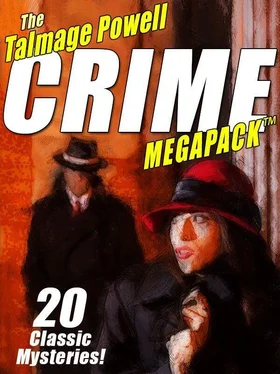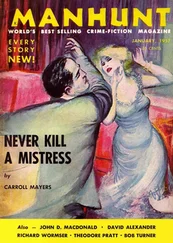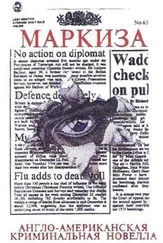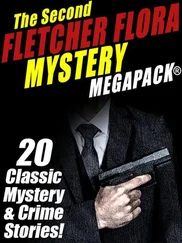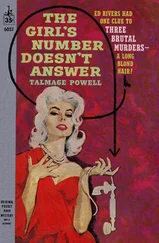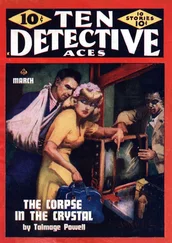“I hate to think of losing the business and my girl, Marco. Really I do, especially since there is only one thing that can definitely link me to the hitchhiker. The rain must have washed the tire tread marks from the shoulder of the road, and I can burn my shoes, in case I left footprints. That leaves just one thing, Marco. You, the lone witness.” Before Marco could speak, Timothy clipped him on the jaw. As he crumpled, Timothy took Marco’s shoulders and directed his fall out the open window. Then he kicked back the throw rug from under the window, which made everything reasonably obvious. Timothy would agree with everyone that it had been most unfortunate for the rug to slip.
Originally published in Alfred Hitchcock’s Mystery Magazine , June 1966.
When I left her apartment, I skedaddled straight to Mr. Friedland’s estate. I left the car standing in the driveway and went in the big stone mansion like a coon with a pack on his trail.
I asked the butler where Mr. Friedland was, and the butler said our boss was in the study. So I busted in the study and closed the heavy walnut door behind me quick.
Mr. Friedland was at his desk. He looked up, bugged for a second by me coming in this way. But he didn’t bless me out. He got up quick and said, “What’s the matter, William?”
I knuckled some sweat off my forehead, walked to the desk, and laid the envelope down. The envelope had a thousand smackers, cash, in it.
Mr. Friedland picked up the money. He looked a little addle pated.
“You did go to Marla Scanlon’s apartment, William?”
“Yes, sir.”
“She was there?”
“Yes, sir.”
“But she didn’t accept the money? William, I simply can’t believe it.”
I couldn’t think of an easy way to explain it to him. “She’s dead, Mr. Friedland.”
He cut his keen eyes from the money to me. He was a lean, handsome man who looked about thirty-five years old in the face. It was just the pure white hair that hinted at his real age.
“Dead?” he said. “How, William?”
“Looked to me like somebody strangled her to death. I didn’t hang around to make sure. There’s bruises on her neck, and her tongue is stuck out and all swelled up like a hunk of bleached liver. She was a mighty fetching hunk of female,” I added with a sigh.
“Yes,” Mr. Friedland said, “she was.”
“But she don’t look so good now.”
“Was she alone in the apartment?”
“I reckon. I didn’t feel the urge to poke around. Just had a look at her there on her living-room floor and hightailed it here.”
Mr. Friedland absently put the thousand bucks in his inside coat pocket. “She was alive three hours ago. She phoned me, just before I went out. I returned, gave you the envelope, and you went to her place and found her dead. Three hours. She was killed between two and five this afternoon.”
“Could have been a lot of traffic in that much time, Mr. Friedland.”
“I doubt it. Not today. Today she was expecting a caller with a white envelope. William, you didn’t see anyone on your way out of the building?”
“No, sir.”
“Phone anyone? Speak to anyone?”
“Not a soul, Mr. Friedland, until I got here and asked the butler where you was.”
“Good. You’re always a good man, William.”
“Yes, sir,” I said. “I try to be.” Which was no lie. I’m a hillbilly from near Comfort, North Carolina, which is back up in the mountains. It’s a mighty poorly place, believe me. Mr. Friedland came up there one summer for a week of fishing. I worked for him that week, and when the week was over he said as how would I like to keep working for him. He said I was intelligent and clean-cut and had respect for other people. He said he needed a chauffeur and a man to do errands and personal chores. He said I would have quarters on a nice estate and steady pay. So naturally I jumped at the chance. That was near five years ago, and I’m glad to say that Mr. Friedland has come to depend on me as few folks can depend on a personal worker. He trusts me and knows I can keep my mouth shut. And that means a lot to a big shot newspaper publisher and television station owner like Mr. Friedland.
While I was simmering down and losing the shakes from my experience in Miss Marla Scanlon’s apartment, Mr. Friedland was busy on the phone. He called Judge Harrison Corday and Mr. Robert Grenick, who is the prosecuting attorney. They were both close friends of Mr. Friedland. He told them to drop everything, he had to see them right away. He said a thing of utmost importance had happened which couldn’t be talked about on the phone. He asked them to come to his study pronto, which they did.
Judge Corday got there first. He was one of the youngest superior court judges in the state. He liked parties and booze, and it was beginning to show around the softening edges of his face. He was a big, reddish man. He’d been a famous football star in college.
He said to Mr. Friedland, “What’s up, Arch? I’ve got a dinner engagement and...”
“You may not want any dinner when you hear what I have to say,” Mr. Friedland said. “To save a lot of repetitions, we’ll wait until Bob Grenick arrives.”
Judge Corday didn’t press Mr. Friedland, knowing it would do no good. He sat down and lighted a dollar cigar and tried to read Mr. Friedland’s lean, tight face.
Mr. Grenick showed up almost before Judge Corday got his cigar going good. Bald, chubby, and middle-aged, Mr. Grenick had thick, heavy lips and thick, heavy eyes. Both his lips and eyes always looked slightly damp, like a lizard’s back that lives in a spring branch.
As soon as Mr. Grenick was in the study and the door safely closed, Mr. Friedland said, “Tell them, William, what you just told me.”
“Miss Marla Scanlon is dead,” I said.
The judge took it without blinking an eye. The state’s attorney, Mr. Grenick, choked, put a hand to his neck, fumbled for a chair, and sat down.
“How?” Judge Corday said, cool.
“Murdered, I reckon,” I said.
Mr. Grenick made noises like he was having a hard time getting air.
“By what means?” the judge asked.
“Choked to death, it looked like,” I said.
“When?”
“Sometime between two and five,” Mr. Friedland put in.
“What makes you think I have any interest until the murderer is caught and I act in official capacity?” Mr. Grenick said raggedly. “I hardly knew Marla Scanlon.”
“Oh, come off it, Bob,” Mr. Friedland said. “Marla Scanlon worked artfully and most skillfully. One by one she compromised the three of us. She didn’t stretch her luck. We three were enough. She had her gold mine. She was content. She didn’t intend to incur further risk by developing, in a manner of speaking, a source of silver.”
Mr. Grenick got half out of his chair, gripping its arms. “I deny any...”
“Please shut up,” Mr. Friedland said quietly. “None of us is on trial, not yet. But we’re the three who might have killed her. It’s reasonably certain that one of us did. She’s milked you the longest, Harrison. I was next. Bob, you’re her third and final golden goose. Between us, we’ve contributed, over a period of time, something like a total of sixty-thousand dollars.”
“Too bad we never reported all that stashed cash to the income tax people,” Judge Corday said. “They might have taken her off our backs.”
“And the hides from our backs right along with her,” Mr. Friedland said.
“How’d you find out all this?” Mr. Grenick asked. “About me, I mean?”
“That’s a rather silly question, Bob,” Mr. Friedland said. “I’m still a top reporter when it comes to digging out the facts. And I have the resources of a metropolitan newspaper at my disposal, don’t forget.”
Читать дальше
